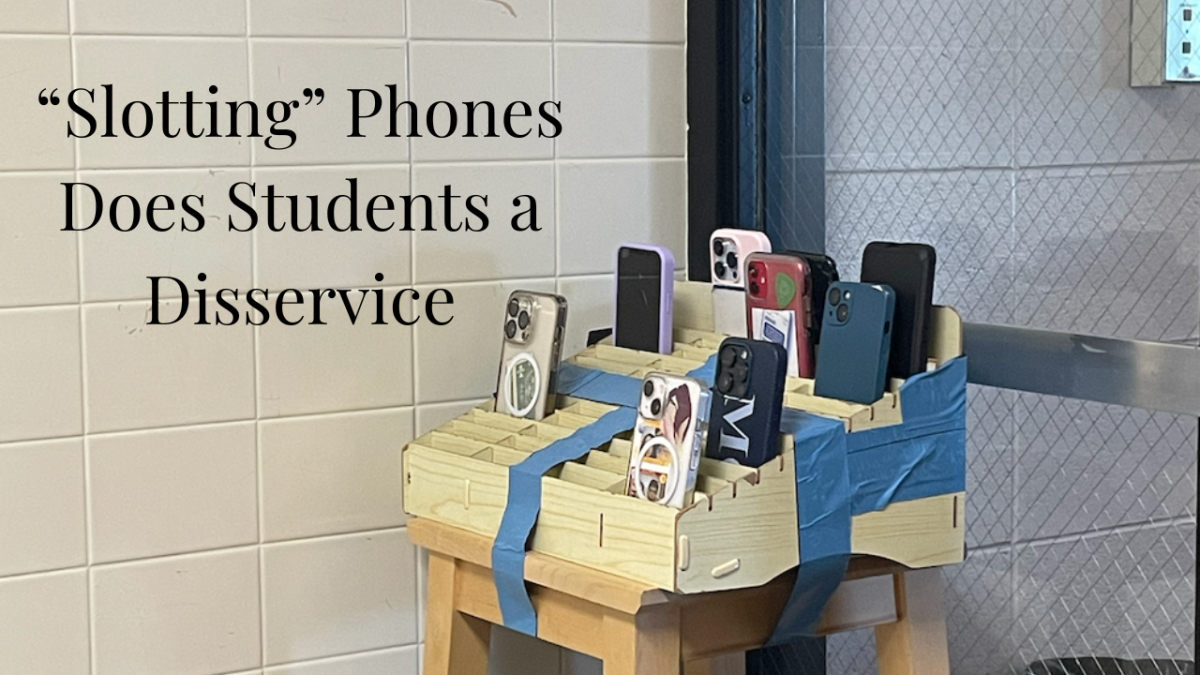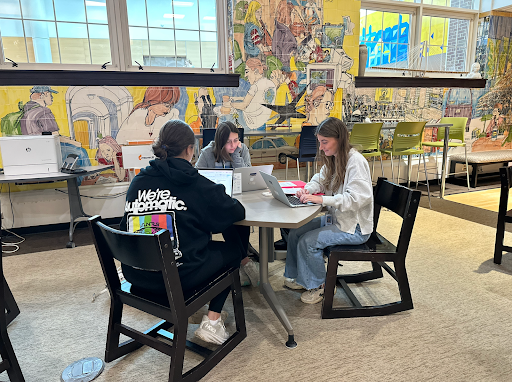Since LFHS put in the “No Phones” during class policy at the beginning of the 2023-2024 school year, my peers and I have experienced a significant change since our underclassmen years. We should switch back to a regular phone policy – in which teachers have the discretion to “slot” our phones – to adapt to the current state of the world.
Harvard experts say that administrators should “consider learning how to teach with tech instead of against it,” especially with the repercussions of the pandemic affecting students both socially and academically. During the COVID-19 lockdown, we all had access to social networks at our fingertips, but coming back to school with the new policy has taken that away from us.
Times are changing. Everyone has a phone as a means of communication and connection to those around them, and that isn’t going to change anytime soon.
I believe that by taking away our phones, the school is doing us a disservice.
It’s almost as if we’re being handheld at all times and told that we have no control over our own decisions. It is students being told that we, 14-18 year old high school students, are not responsible enough to make our own choices in the classroom.
I understand that the ability to connect with others during class time can be distracting for various students and those around them, but to confine an entire student body seems overwhelming. If it is turning into a problem for select students, then the issue can be addressed as such.
Elementary and middle school students should have some restrictions in order to learn responsibility with technology at a young age. Once we have reached the threshold of young adults preparing for life ahead of school, that responsibility should fall into our own hands.
Most adults don’t have to put their phones in a cubby when they walk through the doors at work; they use their phones religiously throughout the day to get their work done. Preparing students for the “real world” can’t be done without integrating current technology into our school days.
If we are being told that in order to learn we need to remove any distractions, we will never know how to be productive in an environment that requires us to utilize our phones as a supplementary device. In a little over a year, I will be sitting in a college lecture with my phone within an arm’s length, and it is likely that the temptation to check every notification will overcome me if I haven’t learned how to prevent screen time into a classroom environment.
Cellphones in school have been said to be a mental health concern. Some states have passed a law allowing districts to have control over the restriction of phone use in schools, but there are many cases where administrators aren’t enforcing these restrictions.
A legislation was introduced by two U.S. senators – one Republican and one Democrat – that would require a federal study to be done on mental health as well as academic impacts on students due to cell phone use. If this were to be followed through with, it could provide clarity to students, parents, and administrators to see if phones in school truly connect to a mental health problem.
As of 2020, 77% of school districts in the country have “prohibited non-academic use of cell phones or smartphones during school hours,” a much larger percentage compared to the 2015 school year where this only pertained to 65.8% of districts. The pandemic could have played a role in this spike in districts since school from home allowed students 24 hour access to social platforms.
If certain initiatives are going to be implemented, then they should also be enforced. If they stop being enforced in certain classes and not others, then why have a school-wide requirement?
I also know that, initially, a big issue for students and parents was the safety concern. I never feel that my safety is compromised when I don’t have my phone in class since the slots are in the classroom.
However, I have walked by a few classes where the phones are outside of the classroom; I would not feel comfortable “slotting” my phone if that was the case.
There have been numerous security concerns, specifically this school year, where I personally have been shocked and worried that these soft lockdowns could lead to something worse. I won’t get caught up in the “what ifs?” of these threats, but if need be, we should have access to the alerts on our phone that could be important in educating ourselves on the situations we are in as a school.
Not to instill panic; rather to be aware of our surroundings.
As a society, we are constantly adapting with modern technology to continue to grow. Students won’t be able to learn to control themselves if they continue to be restricted.








Mr. Dewar • May 15, 2024 at 9:07 am
My phone holder does not appreciate the negative press.
Jason Kowalski • May 15, 2024 at 10:15 am
You are forcing students to leave hundreds of dollars in hardware, not to mention the massive non-monetary value of stored information, in a location where it can easily be stolen. That excuse for a holder deserves all of the bad press that it gets.
If I ran a coffee shop, I wouldn’t force my patrons to leave their handguns loaded on a table by the door. If you’re going to ban people from having something on their person, it’s your duty to prevent it from being stolen.
Norbert • May 17, 2024 at 10:04 am
It’s not that deep bro, its a joke.
Jason Kowalski • May 14, 2024 at 3:30 pm
The “slotting” is already de facto at teacher’s discretion, to the extent which any teacher enforces it. 2 of my classes have no phone-slots at all, and I’m regularly the only student who puts my phone away in two other classes. Even in the three classes where compliance is high, violating the policy often goes undetected.
Personally, I want the standard of separating work/school as much as feasible. I don’t use any school-affiliated services with my personal smartphone, and my home desktop maintains the same separation until I need to print something. Even though I intend to carry personal telecoms and use them for personal shit while on break, I have no reason to use my personal phone at school or office – it’s not my work computer.